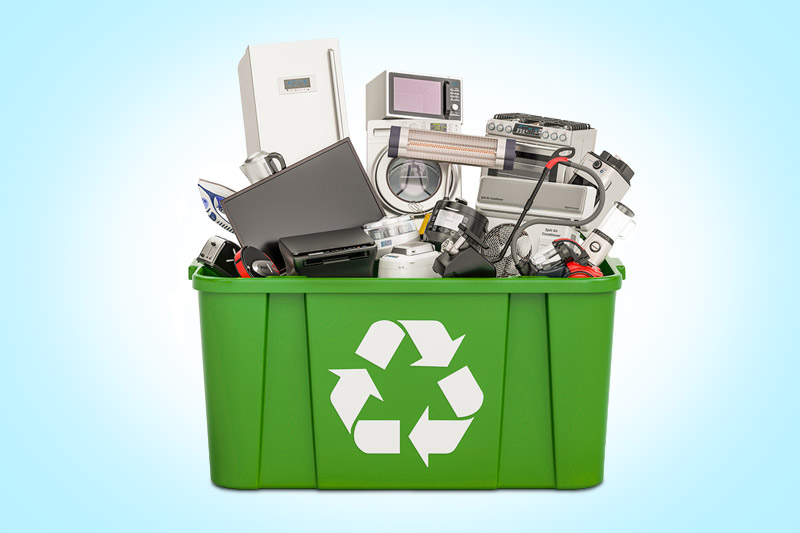Elevate Your E-Waste Administration With R2 Certification: an Extensive Review
One secret method to elevate e-waste management techniques is by attaining R2 qualification. By exploring the processes and benefits connected with R2 qualification, a deeper understanding of how it can revolutionize e-waste management methods arises, shedding light on a path in the direction of sustainability and ethical disposal practices.
Importance of E-Waste Management

When e-waste is not managed correctly, these harmful compounds can seep into the ecological community, triggering injury to wild animals and potentially getting in the food web, posturing risks to human wellness. The incorrect disposal of e-waste adds to pollution and greenhouse gas emissions, exacerbating climate adjustment and environmental degradation.

Advantages of R2 Accreditation

First of all, R2 certification boosts integrity by showcasing a company's commitment to sustainable techniques. It ensures clients, partners, and stakeholders that the company complies with rigorous criteria for e-waste monitoring - r2 certification. This credibility can bring about increased count on and enhanced connections with clients who focus on ecological duty
Second of all, R2 accreditation helps mitigate threats connected with inappropriate e-waste disposal. By adhering to the strict guidelines established forth by the qualification, companies can reduce the probability of information breaches, ecological contamination, and lawful effects. This aggressive approach safeguards the business's credibility and lessens possible obligations.
Lastly, R2 certification shows a dedication to ecological stewardship - r2 certification. By responsibly handling electronic waste through certified processes, companies contribute to the conservation of resources, reduction of contamination, and promotion of a round economic climate. This commitment not just benefits the setting but likewise straightens with evolving consumer expectations for lasting service techniques
R2 Accreditation Process Summary
Having established the benefits of R2 qualification in advertising reliability, danger mitigation, and ecological stewardship, it is necessary to now outline the detailed procedure entailed in obtaining this accreditation. The R2 certification process starts with an extensive testimonial of the company's functional policies and procedures to make sure compliance with the R2 requirement. This initial analysis is vital in identifying any kind of gaps that require to be dealt with prior to proceeding better.
When the company's methods straighten with the R2 basic requirements, an independent third-party auditor carries out an on-site audit to review the implementation and effectiveness of these methods. This audit includes a comprehensive evaluation of documentation, meetings with personnel, and physical evaluations of facilities to verify conformity.
Adhering to an effective audit, the company obtains a certification decision based on the auditor's searchings for. If authorized, the company is approved R2 certification, showing its commitment to accountable e-waste monitoring. It is very important to note that keeping R2 accreditation calls for ongoing compliance my response with the criterion's needs and routine audits to make certain ongoing adherence to ideal techniques in e-waste recycling and disposal.
Trick Requirements for R2 Conformity
A necessary facet of achieving R2 conformity is making sure that all electronic waste (e-waste) handling facilities satisfy rigorous environmental and safety and security requirements. To abide by R2 demands, organizations should comply with key criteria that concentrate on liable e-waste monitoring practices. These standards consist of executing a documented environmental, health, and security monitoring system, making sure the safe and secure handling of data-containing tools, and conducting thorough downstream due persistance to track the final location of e-waste materials.
Additionally, R2 conformity demands the correct testing, refurbishment, and recycling of electronic equipment to expand its helpful life and lessen environmental effect. Facilities looking for R2 qualification have to additionally focus on worker health and wellness and security by supplying needed training, personal safety tools, and a safe workplace. Additionally, keeping comprehensive documents of e-waste processing activities and consistently going through audits by approved accrediting bodies are crucial parts of demonstrating continuous conformity with R2 requirements.
Effects of Lasting E-Waste Practices
The application of lasting e-waste techniques in conformity with R2 conformity about his not just ensures environmental and safety requirements are satisfied but also dramatically affects the general lifecycle of electronic items. By sticking to R2 standards, electronic waste monitoring processes become more efficient, minimizing the ecological impact of digital products. Lasting e-waste techniques promote the appropriate disposal of digital parts, guaranteeing that hazardous products are dealt with responsibly and do not wind up contaminating the atmosphere.
Additionally, embracing lasting e-waste techniques promotes the round economic climate by facilitating the recuperation and reuse of beneficial materials from electronic items. This not only saves priceless resources yet also minimizes the demand for basic material extraction, decreasing the environmental influence of electronic manufacturing. Furthermore, lasting e-waste methods can add to task development in the recycling and refurbishment industries, fostering financial development while advertising environmental obligation. Overall, the fostering of lasting e-waste practices under R2 certification acts as a critical action in the direction of achieving a more eco sustainable electronic devices sector.
Conclusion
To conclude, executing proper e-waste management practices is critical for environmental sustainability and resource preservation. R2 certification plays a crucial function in making sure accountable handling and more info here disposal of electronic waste. By adhering to the rigorous criteria stated by R2 requirements, organizations can not only reduce their environmental effect but additionally add to a more lasting future for generations ahead.
One secret method to elevate e-waste monitoring techniques is by achieving R2 accreditation. By checking out the advantages and processes linked with R2 accreditation, a deeper understanding of exactly how it can revolutionize e-waste monitoring approaches arises, losing light on a course in the direction of sustainability and honest disposal practices.
The R2 accreditation procedure begins with a detailed evaluation of the organization's functional policies and treatments to guarantee conformity with the R2 criterion. If approved, the company is given R2 accreditation, demonstrating its commitment to liable e-waste monitoring. In general, the fostering of lasting e-waste techniques under R2 certification offers as an essential step in the direction of attaining a much more eco sustainable electronics sector.